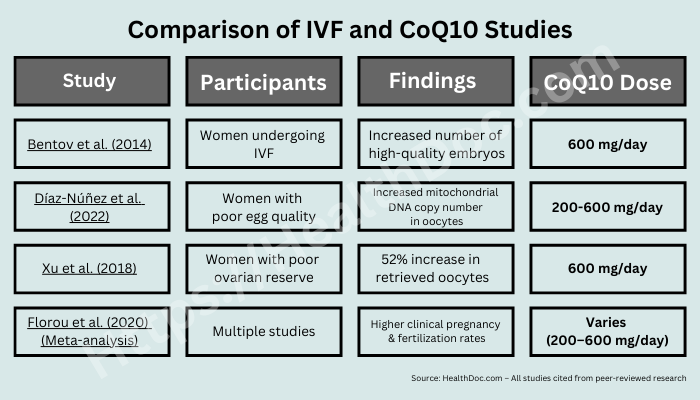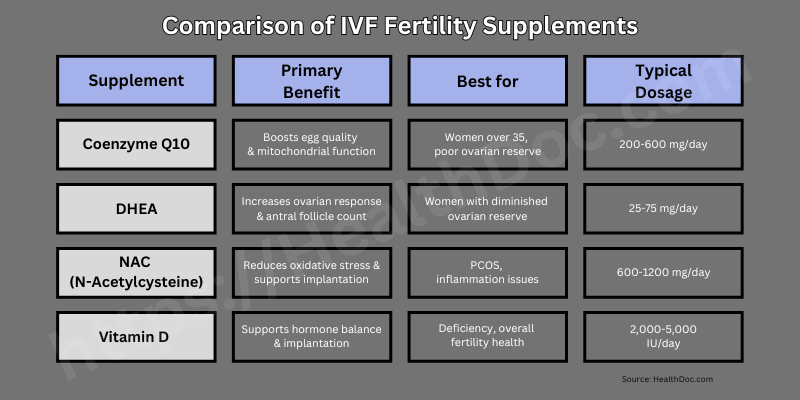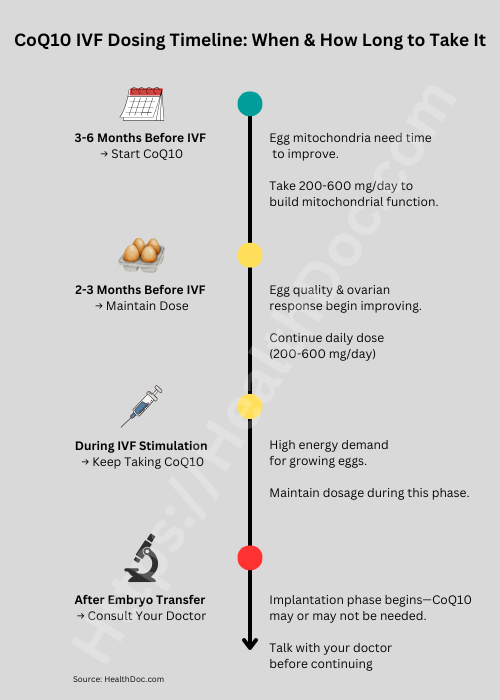Explore All Articles
Explore All Articles

Navigating the challenges of IVF is tough for couples. That makes it all the more exciting when something comes along that might make the successful outcome of this intense, expensive, and often emotionally taxing process even slightly more probable. Coenzyme Q10 has emerged as a potential game-changer. But what does this dietary supplement really do? And is there any scientific evidence to back up its use for making IVF more successful?

In vitro fertilization (IVF) requires high-quality eggs. Supporting embryo development in the very early stages requires energy - and lots of it. That's where the mitochondria come in. They are the so-called powerhouses of the cell. But cells—especially egg cells—also need something else to support mitochondrial function and power embryo development. That something else is a nutrient called coenzyme Q10 (CoQ10).
✅ Coenzyme Q10 is especially abundant in high-energy-demanding cells like heart, liver, muscle, and fertility cells known as oocytes (eggs).The ubiquinone form of CoQ10 plays a key role in energy (ATP) production within the mitochondria. However, its ubiquinol form is also a potent antioxidant, known for its ability to protect cells from harmful oxidative damage, a common risk factor for cell aging. Bentov et al. (2014) found that CoQ10 supplementation increased the number of high-quality embryos, likely due to improved mitochondrial efficiency and reduced oxidative stress.
✅ Díaz-Núñez et al. (2022) found that CoQ10 supplementation increased mitochondrial DNA copy numbers in oocytes—an indicator of better embryo viability.
✅ The antioxidant properties of CoQ10 protect egg cells from being damaged by free radicals. This is especially critical during IVF stimulation.
📌 Takeaway: CoQ10 boosts egg viability and fertility due to its mitochondrial-enhancing properties. It also reduces reactive oxygen species (free radicals). These two biochemically beneficial effects of CoQ10 allow for viable, healthy eggs that yield a much higher chance of successful fertilization.
It can be a challenge to get enough eggs when doing IVF for women with poor ovarian reserve. Supplementing with CoQ10 may help them to enhance their response.
✅ Xu et al. (2018) conducted a randomized controlled trial demonstrating that women pre-treated with CoQ10 had:
📌 Takeaway: Increased CoQ10 levels may improve ovarian response in women undergoing IVF, resulting in more fertilization-ready eggs.
High-quality eggs mean more viable embryos, which gives fertility specialists better options for implantation.
✅ A meta-analysis by Florou et al. (2020) found that CoQ10 supplementation was associated with:
📌 Takeaway: CoQ10 may enhance embryo quality, improving implantation success rates during IVF. The quality of embryos may be enhanced by CoQ10 which can lead to better implantation success rates for couples undergoing IVF.
The quality of a woman's eggs decreases naturally with age. This is thought to be due in large part to a progressive increase in mitochondrial dysfunction. The theory is that CoQ10 can slow, stop, or even partly reverse this egg-aging process. While evidence supporting CoQ10's powerful effects on egg quality and mitochondrial health is building, many questions remain.
✅ Giannubilo et al. (2018) studied women over 35 undergoing IVF and found that CoQ10 supplementation led to:
📌 Takeaway: Egg viability may improve with CoQ10 supplementation in older women, making it a promising option for those over 35 who are pursuing IVF.
Dr. Natalie Crawford, MD, a board-certified reproductive endocrinologist, emphasizes the importance of CoQ10 in fertility, particularly in its role in supporting the quality of eggs and sperm.
📌 Key Insights from Dr. Crawford: ✅ CoQ10 counters mitochondrial decline, a leading cause of poor egg quality that is related to the aging process.
✅ IVF Benefits: Studies indicate that CoQ10 enhances the quantity and quality of eggs and embryos generated during in vitro fertilization. This enhancement is seen not only in the number of embryos but also in increased rates of genetic normality and better development which all improve the conditions for implantation and pregnancy.
✅ Improvements in Sperm Quality: CoQ10 has the potential to elevate sperm concentration, motility, and health. More research is needed in this area.
✅ Recommended Coenzyme Q10 Dose for Fertility:*
High-quality supplements are crucial, says Dr. Crawford, because not all CoQ10 products are equally effective. She recommends consulting with your doctor before taking CoQ10, particularly if you are on blood thinners like Warfarin.
📌 Takeaway: A growing number of fertility specialists, including Dr. Crawford, advocate for CoQ10 for women with older eggs, oxidative stress, or are undergoing fertility treatments like IVF.
In her YouTube video, Dr. Crawford discusses CoQ10 and fertility in greater detail.
In addition to the scientific studies showing the benefits of CoQ10 on egg quality and the success of IVF, many real-world patients have seen dramatic developments regarding their fertility and achieved better fertility outcomes after having added CoQ10 to their fertility management plans.
✅ Sonya's Story: At 32, Sonya had fought a long battle to conceive naturally. Year after year, she had gone through the hope and despair of seeing so many pregnancies happen around her while they remained childless. Then they turned to IVF. But even there, they found no immediate success as she was found to have poor ovarian reserve and they were unable to retrieve any viable eggs in her first cycle. Her doctor recommended 600mg of CoQ10 per day for four months before trying again. In her next cycle, she produced five PGT-A normal embryos, significantly improving her chances of a successful pregnancy.
✅ Susan's Story: 34 year old Susan’s first round of IVF was not successful. They were only able to retrieve a few eggs from her and the fertilization rates were low. Susan started taking CoQ10 before her second IVF cycle in an effort to improve their results. The second round was dramatically better. 11 eggs were obtained - 8 of which were mature. Of those, 6 were successfully fertilized and 5 made it to the blastocyst stage.
📌 Takeaway: Although individual outcomes differ, Sonya and Susan's narratives are consistent with the data we're seeing—CoQ10 has the potential to significantly help with egg quality, ovarian response, and embryo development, particularly in women with diminished ovarian reserve or a previous unsuccessful cycle.
A lot of individuals pursuing IVF or attempting to conceive often find themselves deliberating over whether CoQ10 is the most suitable supplement to take or if other fertility-promoting nutrients might prove more advantageous. Even though CoQ10 has a reputation for not only enhancing egg and sperm mitochondrial function and for bolstering overall fertility health, several other supplements—DHEA, NAC, and vitamin D, to name a few—might also positively impact IVF outcomes.
📌 The table below highlights how CoQ10 compares to other fertility supplements in terms of benefits, best use cases, and recommended dosages.

💡 Takeaway: CoQ10 is particularly beneficial for egg quality and mitochondrial function, while DHEA helps with ovarian reserve, NAC reduces oxidative stress, and Vitamin D supports hormonal balance. If you’re unsure which supplements are right for you, consult your fertility specialist for personalized guidance.
Although many patients undergoing in vitro fertilization (IVF) see improvements in egg and mitochondrial function quality after CoQ10 supplementation, some people will benefit more than others. Here are a few instances where you might not want to take it or might not see the benefits you'd expect.
Although CoQ10 can help improve the odds for many couples undergoing IVF, it’s not a universal fix. Knowing when it is most effective—and when it may not be needed—can help patients and doctors choose what is best for them.

When and how should you take CoQ10 for fertility
✅ Important Absorption Tip:
The body is unable to absorbing more than 200mg of CoQ10 at a time. Split larger doses into two or three smaller doses throughout the day (e.g., 600mg → 200mg in the early morning, late morning, and early afternoon).
✅ Additional Tip: Take CoQ10 with some food containing healthy fat for better absorption.
With the advance of IVF technology, frozen embryo transfers (FETs) have become more common. In many cases, they yield a better pregnancy rate than is seen with fresh transfers. Can Coenzyme Q10 play a role in improving FET success?
✅ Why This Matters:
✅ What the Research Says:
✅ Future Possibilities:
📌 Takeaway: Although CoQ10 is a known and effective tool for enhancing egg quality, its potential for enhancing embryo survival and and success (implantation) rates after undergoing a freeze/thaw cycle is exciting but remains an area in need of more research. If you are considering FET, talk to your doctor about whether CoQ10 could be a beneficial addition..
CoQ10 isn’t a magic bullet, but research strongly suggests it can improve IVF outcomes. By enhancing egg quality, ovarian response, and embryo viability, it may significantly increase your chances of a successful pregnancy.
However, individual results vary, and CoQ10 should be part of a broader fertility strategy—including a balanced diet, stress reduction, and medical guidance.
Want to Learn More?
🔹 Our CoQ10 Supplement Guide breaks down bioavailability, dosages, and what to look for in a high-quality supplement.
🔹 Most studies recommend 200–600 mg per day, starting at least 3 months before treatment for maximum benefit.
🔹 Yes. Research suggests CoQ10 may improve mitochondrial function, enhancing egg viability in women over 35.
🔹 Generally yes, but consult your fertility specialist to confirm safety for your specific case.
🔹 While this article focuses on female fertility, some studies suggest that CoQ10 may improve sperm quality in men by reducing oxidative stress and enhancing mitochondrial function.
🔹 Studies indicate that CoQ10 needs at least 2–3 months to influence egg quality, as egg maturation takes around 90 days.
🔹 There are no major documented interactions between CoQ10 and fertility drugs. However, always check with your doctor before combining supplements with medications.
🔹 Some doctors recommend stopping CoQ10 after embryo transfer, while others allow continued use. There is limited research on CoQ10 during pregnancy, so consult your healthcare provider.
🔹 While ubiquinol is often marketed as "better absorbed," studies on fertility have mostly used ubiquinone. Your body naturally converts between the two forms as needed.
🔹 Yes. CoQ10 has been linked to improved sperm quality, motility, and concentration. Since it reduces oxidative stress, it may enhance male reproductive health.
I may be a doctor, but I am not your doctor. Before making any changes to your current treatment regimen—including adding CoQ10—discuss your options with a healthcare provider who knows you, your history, and your health goals.
Whether you are much interested in investing, our collection of articles is designed to educate and empower you.